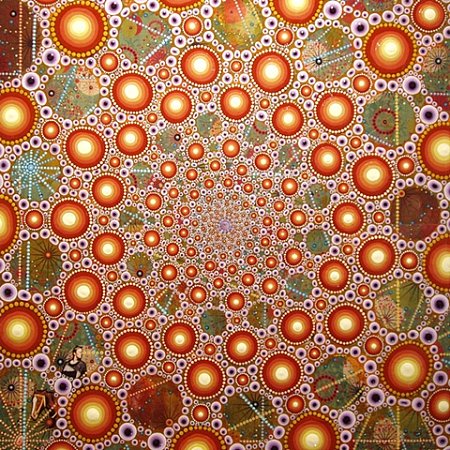
Out of Place
A bullet fired out here would fall out of sheer boredom, and even though my car shoots along the highway at sixty miles an hour, despair feels dangerously close. Because I read landscapes the way I do books—I imagine myself in them—my insides start to shift. What if my car breaks down? What if I lived in this blackboard-flat landscape with nothing to stop the wind or the madness it can bring?
What serious thoughts for a Sunday morning, especially since I am hurtling toward the delightfully absurd: a Polka Mass. In the passenger seat are my directions and my list. Six items have been crossed off; this is my seventh attempt to find the holy in Minnesota this year.
I pass a farmer driving his tractor through a field of fresh hay. He’s the first person I’ve seen in miles. Finally, I turn left and drive straight for another ten miles. I wouldn’t know Florian, Minnesota, was a town if there wasn’t a church standing there on the right. Otherwise, the town looks like a couple of houses and maybe an auto shop (although that could just be someone’s shed). For the day’s festivities, port-a-potties line the parking lot.
Large trees offer shade on one side of the church, so I park my car there. As I climb the steps, I pass between two cream-colored angels who guard the staircase. For some reason, I’m glad no one thought to clean the dirty cobwebs off their faces.
I follow an elderly couple into the church, where they are greeted by a woman who says something in a different language. The old man laughs, and his wife grabs his arm. “What did she say?”
Her husband translates: “Welcome to church. May you always be Polish.”
The inside of the church is the same cream as the angels out front, except for the gold molding. The ceiling has a broad, gentle curve to it as if we are in the belly of a beer barrel, which feels right since this is a Polka Mass, and two men are already pumping away on accordions at the front of the sanctuary. As of yet, no one mans the drum set, the guitar, the bass, or the microphones. It’s just the two accordions, wheezing at the people who stream into the pews that must seat at least three hundred. I didn’t pass that many tiny towns—dead or alive—on my way here, nor a bounty of farms. From where do they expect such a multitude to come?
Even if we hadn’t been greeted in Polish as we entered, one look at the stained glass windows would have offered me a clue about the locals’ heritage: Donated by Franciszek i Balbina Borowicz & Synowie i Ray i Jan z Rodzinami.
A woman stops at the end of my pew. “Is anyone sitting there?” she asks. A small girl peeks out from behind her legs. As soon as the girl catches me looking at her, she ducks out of sight again. All I can see is a pair of small hands clutching the woman’s skirt.
“Please,” I say, gesturing to the pew. I turn my knees to the side so she and the little girl can slide in. I could have moved to the middle, but my place here feels uncertain—I am not from these parts, I am not Catholic—so I stay on the outside, away from the heart of things.
Once she’s settled, the little girl grabs the big worship book from the rack in front of her. She can barely lift it, but when she manages to get it to her lap, her blue eyes swing in my direction. She wants to make sure I can see that she knows exactly what to do. How big and important she is. I smile. She smiles.
